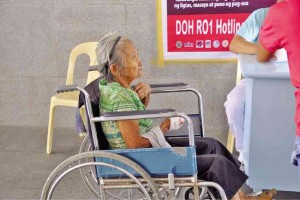
THE DANGERS of firecrackers won’t spare spectators and the elderly, like this woman in Dagupan City who is seeking treatment at a government medical center for wounds inflicted on her hand by an exploding firecracker during New Year’s Eve revelry. WILLIE LOMIBAO/CONTRIBUTOR
CITY of San Fernando—The number of residents injured by firecrackers in seven Central Luzon provinces surged to 559, indicating that the campaign of the Department of Health (DOH) had been ignored and needed more support from local governments, a DOH official said on Wednesday.
Dr. Jessie Fantone, head of the DOH regional epidemiology center, said the agency released the final figure of firecracker-related injuries only on Wednesday due to late entry of data from the seven provinces. The monitoring period covered Dec. 21 to Jan. 5.
The number of cases was 12 percent higher than the 499 cases recorded in 2013. The 2013 cases were higher by 9 percent than the 2012 cases.
Improved reporting
Asked if the figures showed that the DOH drive was not heeded, Fantone said: “Most probably. In spite of the campaign, many still lighted firecrackers.”
The increase in figures this year was in part due to an improved reporting by 80 hospitals and rural health units, he said.
“I don’t see [the campaign] as a total failure but I support the creation of an ordinance banning the buying and selling of fireworks,” he said.
The campaign should be more specific about children’s safety, he said, noting that 170 victims in the region were children aged 1 to 10 while 221 victims were aged 11 to 20.
At least 40 victims suffered eye injuries, 499 had burns while 20 others lost their fingers, hands or feet.
Stray bullets wounded five men, aged 6 to 66, in the region, the DOH said.
Only ban
The highest number of injuries, at 129, was recorded in Bulacan province, a major producer of firecrackers and pyrotechnic products.
This was followed by Pampanga province, with 124 injuries, and Tarlac province, with 105.
At least 234 injuries were caused by “piccolo,” 97 by “kwitis” (skyrocket) and 46 by “luces” (sparklers).
Among 116 towns and 14 cities in Central Luzon, only Olongapo City has an ordinance banning the storage, sale and use of firecrackers.
In the Ilocos region, the regional police said the number of blast victims reached 329, higher than the 241 victims reported last year.
Senior Supt. Angelito Dumangeng, regional police operations and plans division chief, said most injuries were caused by piccolo.
He said four cases of indiscriminate firing were reported to the police, three of which are in Pangasinan province.
Police also recorded three victims of stray bullets, all in Pangasinan.
The provincial health office (PHO) in Pangasinan reported 256 blast injury victims, most of them children. This was higher than last year’s 180 cases, said Dr. Anna Maria Teresa de Guzman, PHO chief.
In Cagayan Valley region, police recorded 87 firecracker-related injuries while two persons were wounded by stray bullets during the New Year revelry.
Chief Supt. Miguel Laurel, regional police director, did not identify the stray bullet victims, but a report from the Cagayan Valley Medical Center in Tuguegarao City said one of them was a 12-year-old boy from Enrile town in Cagayan province. Reports from Tonette Orejas, Inquirer Central Luzon, and Gabriel Cardinoza and Villamor Visaya Jr., Inquirer Northern Luzon